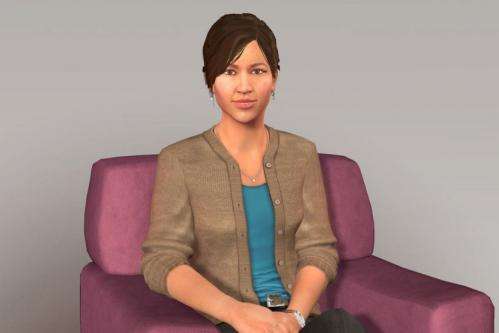Virtual humans inspire patients to open up, study says

(Medical Xpress)—When we feel down and find ourselves at the doctor's office for help, the best person to get us to open up about our problems isn't a person at all. It's a computer.
A new USC study suggests that patients are more willing to disclose personal information to virtual humans than actual ones, in large part because computers lack the proclivity to look down on people the way another human might.
The research, which was funded by the Defense Advanced Research Projects Agency and the U.S. Army, is promising for people suffering from post-traumatic stress and other mental anguish, said Gale Lucas, a social psychologist at USC's Institute for Creative Technologies, who led the study. In intake interviews, people were more honest about their symptoms, no matter how potentially embarrassing, when they believed that a human observer wasn't in on the conversation.
"In any given topic, there's a difference between what a person is willing to admit in person versus anonymously," Lucas said.
The study, which will be published in the journal Computers in Human Behavior, provides the first empirical evidence that virtual humans can increase a patient's willingness to disclose personal information in a clinical setting, researchers said. It also presents compelling reasons for doctors to start using virtual humans as medical screeners. The honest answers acquired by a virtual human could help doctors diagnose and treat their patients more appropriately.
The recruitment process
Researchers recruited 239 adults through Craigslist to participate in the study. The adults, whose ages ranged from 18 to 65, were invited to a laboratory to interact with a virtual human as if they were being admitted to a clinic or hospital.
Subjects were interviewed as part of an evaluation of SimSensei, a virtual human application that can be used to identify signals of depression and other mental health issues through real-time sensing and recognition of nonverbal behaviors. It is a research project designed to assess the potential of such technology and is based on more than 10 years of virtual human research and development at ICT.
Some participants were told the virtual human's responses were fully automated, others were told that the responses were remotely controlled, puppet-like, by a human observer in another room. In reality, all participants were randomly assigned a fully or semi-automated virtual human, regardless of what they were told, and their video interviews were later analyzed by a (human) researcher.
The mere belief that participants were interacting with only a computer made them more open and honest, researchers found, even when the virtual human asked personal questions such as, "What's something you feel guilty about?" or "Tell me about an event, or something that you wish you could erase from your memory."
In addition, video analysis of the study subjects' facial expressions showed that they were also more likely to show more intense signs of sadness—perhaps the most vulnerable of expressions—when they thought only pixels were present.
Opening up to a virtual human
One participant who thought the virtual human was automated said the experience was "way better than talking to a person. I don't really feel comfortable talking about personal stuff to other people."
In contrast, a participant who thought the conversation was being observed told researchers, "I wish you hadn't told me that other people were in the other room listening in. It was weird, like, I don't even know these people. I would have said a lot more stuff if they weren't there."
The virtual human named Ellie opened the conversation with questions such as "Where are you from originally?" and incorporated feedback ("I'm sorry to hear that") and empathetic listening through facial expressions and nodding. Secondly, "her" virtual nature gave participants a sense of anonymity, making them more willing to disclose personal information in a private setting without fear of criticism.
"We know that developing a rapport and feeling free of judgment are two important factors that affect a person's willingness to disclose personal information," said co-author Jonathan Gratch, director of virtual humans research at ICT and a professor in USC's Department of Computer Science. "The virtual character delivered on both these fronts and that is what makes this a particularly valuable tool for obtaining information people might feel sensitive about sharing."
The researchers were careful to emphasize that the virtual human could supplement—not replace—trained clinicians. Still, the implications of the findings are plentiful both in terms of reducing costs and improving care, and several are being explored in projects being developed at ICT, including virtual humans to help detect signs of depression, provide screening services for patients in remote areas or act as role-playing partners for training health professionals.
In an age where people are increasingly interacting with computers over real people for everything from banking to grocery shopping, the researchers hope that opening up to a virtual character will open the door for people to get the care they need in a variety of health care settings as well.
More information: Computers in Human Behavior, www.sciencedirect.com/science/ … ii/S0747563214002647
















